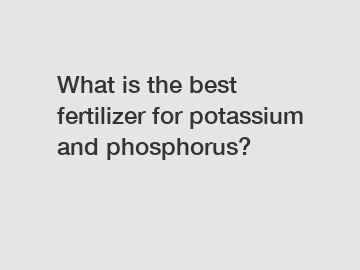What is the best fertilizer for potassium and phosphorus?
What is the best fertilizer for potassium and phosphorus?
Fertilizers play a vital role in maintaining the health and productivity of plants. Among the essential nutrients required by plants, potassium and phosphorus are two crucial elements for their growth and development. Choosing the best fertilizer to supply these nutrients can significantly impact the overall health and yield of your plants. In this article, we will delve into the various types of fertilizers available and discuss their suitability for providing potassium and phosphorus.
1. Understand the importance of potassium and phosphorus:

Potassium, symbolized by the letter K, is responsible for numerous physiological functions within plants. It improves their disease resistance, helps regulate water balance, and enhances the transportation of nutrients and sugars. Phosphorus, symbolized by the letter P, is crucial in energy transfer and storage, root development, and flower production. Both elements are essential for overall plant growth and reproduction.
2. Identify the different fertilizer options:
a. Synthetic fertilizers: These fertilizers are formulated to provide specific nutrient ratios. One popular type is the NPK fertilizer, which contains all three primary nutrients: nitrogen (N), phosphorus (P), and potassium (K). NPK fertilizers have different compositions, indicated by numbers on the packaging. For instance, a fertilizer labeled as 10-10-10 signifies equal percentages of nitrogen, phosphorus, and potassium. To focus on potassium and phosphorus, a fertilizer with a higher K-P ratio would be suitable.
b. Organic fertilizers: These are derived from natural sources, such as animal manure, compost, bone meal, or rock phosphate. Organic fertilizers release nutrients slowly and improve soil structure and microbial activity. They may contain varying amounts of potassium and phosphorus but are generally lower in concentration than synthetic fertilizers.
3. Consider soil testing:
Before deciding on the best fertilizer, it is crucial to conduct a soil test. Soil testing provides valuable information about the nutrient levels in your soil and helps you determine the appropriate fertilizer to use. Contact your local agricultural extension service to learn about soil testing options in your area.
4. Assess your plant's requirements:
Different plants have varying nutrient requirements. Some plants, such as fruits and vegetables, have higher potassium and phosphorus demands, while others have lower requirements. Understanding your plant's needs will help you select a fertilizer with the right nutrient balance.
5. Consider the application method:
Fertilizers can be applied in various forms, including granules, liquids, or powders. Each method has its advantages and disadvantages. Granular fertilizers are easier to handle and provide a slow release of nutrients. Liquid fertilizers are faster-acting, but they require more frequent applications. Choose the application method that aligns with your preferences and the needs of your plants.
6. Follow the manufacturer's instructions:
Fertilizers should always be used following the manufacturer's instructions. Over-application can result in nutrient imbalances and harm the environment. Be sure to carefully measure and apply the recommended amount.
In conclusion, determining the best fertilizer for potassium and phosphorus depends on factors such as soil composition, plant requirements, and personal preferences. Synthetic fertilizers with higher K-P ratios can be effective in supplying potassium and phosphorus. However, organic fertilizers may also be suitable, especially if you prefer a slower release of nutrients and want to improve soil quality. Remember to conduct a soil test, understand your plant's needs, and follow application instructions for optimal results. By choosing the right fertilizer and providing your plants with essential nutrients, you can promote their overall health and maximize their productivity. So, what is the best fertilizer for potassium and phosphorus? It ultimately depends on your unique gardening situation!
For more npk 20 20 20 fertilizer, Ammonium sulphate granular, syfertinformation, please contact us. We will provide professional answers.

Comments